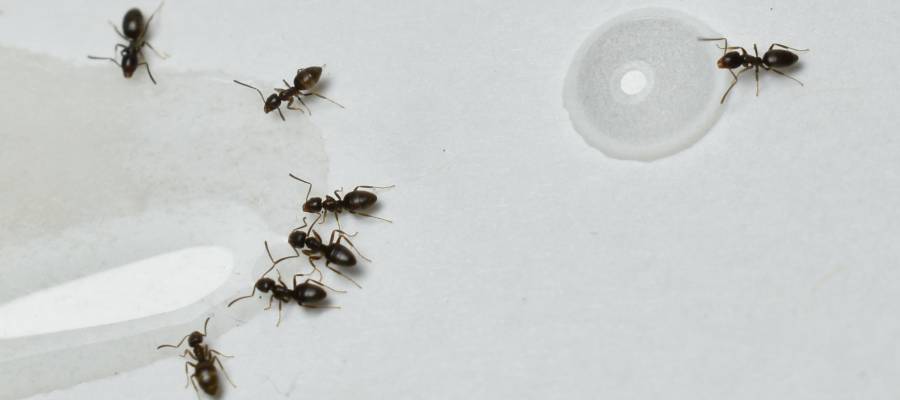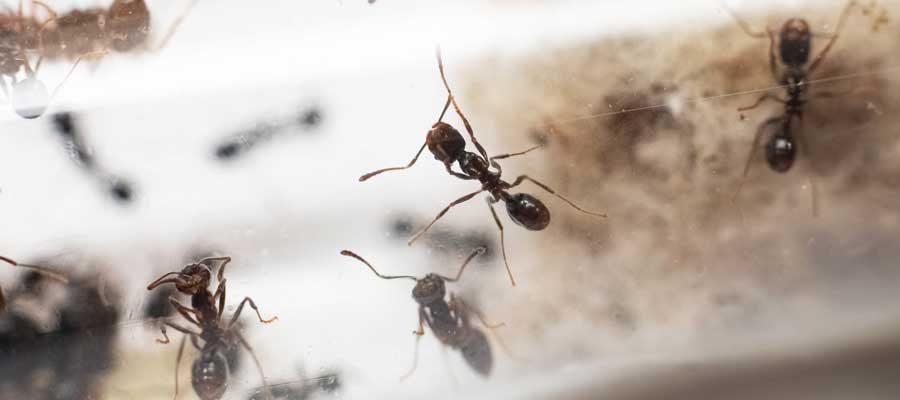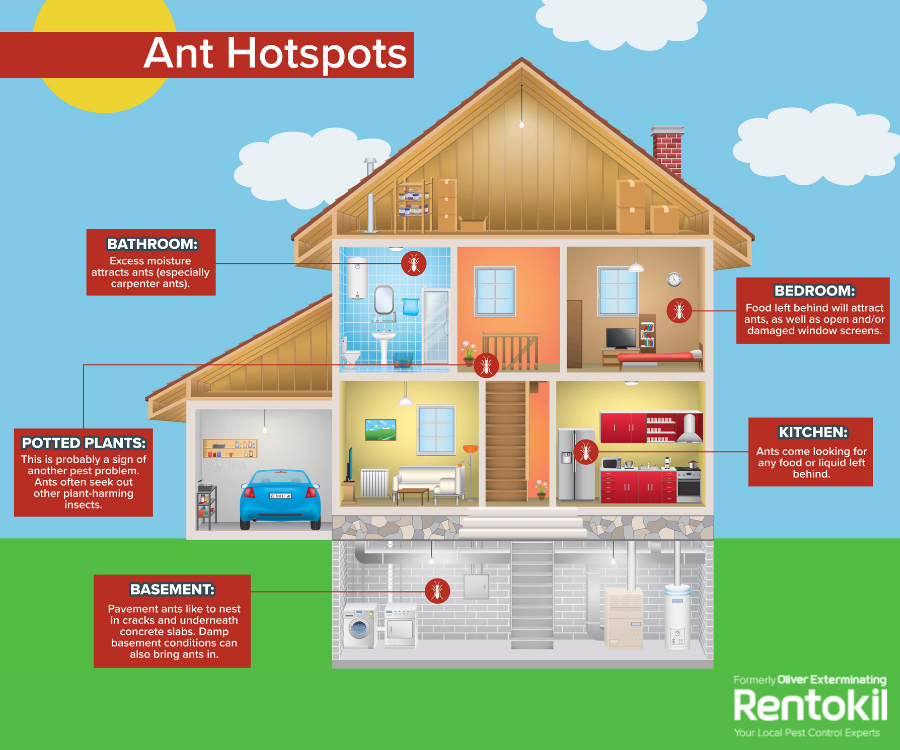Oliver Exterminating’s integrated Pestfree365 program recognizes that pests need shelter, food, water, and a way of getting into your home in order to gain a foothold. Deny pests like ant…
Continue readingPestfree365 with Rentokil, formerly Oliver Exterminating
 There’s a reason that Rentokil, formerly Oliver Exterminating, has been Puerto Rico’s leader in pest control since 1956. Beyond our commitment to staying ahead of the curve in technology, practice, and environmental sensitivity, we also commit to keeping our patrons pest-free all year long. Our Pestfree365 program is a hit among our most loyal customers. Covering dozens of types of pests around San Juan PR, our technicians have an answer for your infestation. Read on to learn more about our services!
There’s a reason that Rentokil, formerly Oliver Exterminating, has been Puerto Rico’s leader in pest control since 1956. Beyond our commitment to staying ahead of the curve in technology, practice, and environmental sensitivity, we also commit to keeping our patrons pest-free all year long. Our Pestfree365 program is a hit among our most loyal customers. Covering dozens of types of pests around San Juan PR, our technicians have an answer for your infestation. Read on to learn more about our services!
What Kinds of Pests in San Juan Are Covered?
Unfortunately, our climate creates perfect breeding grounds and feeding situations for all sorts of regional pests. With many insects and arachnids’ ability to proliferate quickly and spread their populations wide, it’s crucial to stay on top of DIY pest prevention if you aren’t covered routinely by professional exterminators. If you sign up for Pestfree365, the technicians at Rentokil, formerly Oliver Exterminating, will be able to handle these pests for you:
- Rodents
- Ants
- Bed Bugs
- Cockroaches
- Bees, wasps, and hornets
- Fleas, ticks, mites and many more
What Can You Expect from Pestfree365?
We’ve talked to a few members of our Pestfree365 program about their hesitance to sign up for a year-round prevention program. While this is understandable, this perspective often comes from people who haven’t had to pay hundreds or even thousands of dollars repairing damage caused by termites, rodents, and more pests that thrive around San Juan PR. Here are a few of the benefits that you will receive after signing up for Pestfree365:
- Limitless service calls: Whenever you’re dealing with a pest problem, no matter how big or small, we will be out to help you. Even if you fear for an upcoming pest season, we can come out to your property to help you prepare your home or business properly!
- No contract: You are not paying in advance for a year-long, non-refundable service. We have to continue to earn your business with top-tier work and professionalism with every visit.
- Professionalism: Speaking of top-tier, every one of the technicians serving your property will be licensed, certified, and trained to the highest standards of the pest control industry.
- Termite and bed bug protection: Some pest control companies avoid dealing with these two pests for the simple fact of how difficult they can be to control. We don’t back down from these destructive insects! You’ll receive an annual termite inspection (WDI report) and any necessary bed bug removal treatments.
Year-Round Pest Control in San Juan
If you’re looking to maintain a pristine property free of pests, your best bet is to work with your local pest experts at Rentokil, formerly Oliver Exterminating. Our Pestfree365 service is the best in the business for prevention, exclusion, and control of almost 40 local pest species. Contact us today for a free quote!
How Ant Infestations Start in Your Home
 It’s easier than you might imagine for ants to find what they need in your home. Ants are simple creatures—they’re on the lookout for food and water and will stop at nothing to acquire enough. If you leave ants with a supply of resources and an open path to get there, you will find a trail of them marching through your house in no time.
It’s easier than you might imagine for ants to find what they need in your home. Ants are simple creatures—they’re on the lookout for food and water and will stop at nothing to acquire enough. If you leave ants with a supply of resources and an open path to get there, you will find a trail of them marching through your house in no time.
So, how does this usually happen, and what can we do to prevent it from happening? Read on for Rentokil formerly Oliver Exterminating’s perspective on the ways that ant infestations usually start and what we can do to stop them.
How Do Ant Infestations Start?
Ant infestations usually start when a lone ant finds a source of food in your house. They emit a pheromone that signals to the rest of their colony to follow them to the food, and a trail starts to form. Some foods that ants commonly seek out are:
- Fruits
- Meats
- Bread
- Spilled sodas and anything else that’s full of sugar
If you’re thinking, “I clean up all of my messes and store my food away, why are there still ants in my house?” the reason for your infestation might be less obvious than others’. It could be a problem with your house. Ants will also take open opportunities for warmth and shelter in your house, entering through:
- Gaps in wood paneling or brickwork
- Holes in foundation
- Ventilation systems
- Cracked plumbing fixtures, and more
What Can I Do to Keep Ants Out?
The first step to keeping ants out is keeping your kitchen and bathroom clean. All food products should be sealed and stored when not in use, and any spills should be cleaned up promptly. For extra ant protection, clean up spills with a vinegar-based or lemon-scented solution. Excess moisture from your shower or sinks often leads to ant infestations, too.
If you’re still dealing with ant intrusions in a clean home, check around the exterior of your house for easy points of entry. Seal any gaps or openings that you find around the outside of your house or inside along your baseboards. Also, be on the lookout for cracks in your plumbing fixtures. Additionally, take your trash out regularly and keep your bins far away from your house.
Need Professional Ant Control in San Juan?
Sometimes you just can’t find the source of your ant infestation. If you feel that you’re out of luck, you can count on your local pest control company to help you get rid of your ant problem. The expert ant exterminators at Rentokil formerly Oliver Exterminating have years of experience eliminating ant infestations in San Juan and are equipped to do the same for you! Contact us today for a free estimate on ant control.
Ways to Stop Inviting Pests Into Your Home in Puerto Rico
 There’s really nothing more frustrating than having a pest control issue but not knowing where the pests are coming into your home from. The truth is that pests need a few simple ingredients to thrive. Shelter, food, warmth, and water are right at the top of the list.
There’s really nothing more frustrating than having a pest control issue but not knowing where the pests are coming into your home from. The truth is that pests need a few simple ingredients to thrive. Shelter, food, warmth, and water are right at the top of the list.
With pests being such a common problem in Puerto Rico, it’s crucial to learn how to prevent infestations. Learn how with tips from Rentokil formerly Oliver Exterminating!
Signs of Pest Problems
Unfortunately, many Puerto Rican households sometimes forget to drain their sinks or bathtubs after using them or leave food around for pests like mice, ants, and cockroaches to feast on. Decanting birdbaths or small kiddie pools to prevent mosquitoes is simple enough but too many homeowners wait until it’s too late. Signs that pests have already made it into your home include droppings, noises in the walls or along your floorboards, chewed wrappers or wiring, a musky smell in the basement, or damaged wood. Seeing any of these signs of pests warrants a call to your local exterminators.
Tips to Reduce Pests in Your Home
Fortunately, there are DIY stops that you can take to significantly reduce the chances that pests make inroads into your home or business.
1. Store Food Securely and Keep a Clean Home
- The easiest step that you can take right now to prevent pests from making your home an oasis is making sure that all of your food is canned, zipped, protected by plastic containers, or unopened in a drawer.
- Food or morsels of food on the floor or in the carpet can make it far too easy for mice and other pests to snatch up. If you’re unsure if your kitchen floor is totally free of food, then a quick sweep or vacuum should be enough.
- Your garbage can also be a hotspot for animals who want nothing more than to chow down. Keep a tight lid on your trash to prevent that from happening.
2. Seal Holes and Crevices Around Your Home
- Next, you’ll want to prevent pests such as snakes or spiders as well as small pests like mice and ants from getting the chance to enter your home in the first place. But how? Caulking your windows and doors is a great prevention method. As it turns out, weatherstripping and caulking are also wonderful ways to conserve your heating efforts and save on your energy expenses this winter season.
- Small openings along your baseboards are also ways that critters make it into your home through walls or move from room to room. Plugging up any gaps that you find and perhaps adding screens to your windows and doors can be really beneficial.
3. Keep Your Home and Backyard Free of Clutter
- Pests such as cockroaches and even termites like to hide in dark places. Out of sight is unfortunately out of mind for too many Puerto Rican homeowners.
- One way to prevent pests from wreaking havoc on your home is to keep your home and backyard free of clutter. This means keeping trees trimmed and woodpiles away from the home.
- Removing standing water is also a great way to prevent mosquitoes in your yard.
Keep Pests Out Of Your Home For Good
Unfortunately, Puerto Rico is a haven for pests. The only long-term way of ensuring a future free of pests is enlisting the help of professionals to monitor the situation and make pest control visits when necessary.
Rentokil formerly Oliver Exterminating has been trusted since 1956, giving personal and thorough pest control care for residents of Puerto Rico and surrounding areas. We make it our mission to provide the best pest management possible and help you to maintain a pest-free home or work environment. To learn more, contact our residential pest control experts today!
Afraid of Rodents and Bugs? 2021 May Not Be Your Year
 Entomologists from Rentokil Provide their Pest Predictions for 2021
Entomologists from Rentokil Provide their Pest Predictions for 2021
READING, Penn. (Jan. 4, 2021) — As if 2020 didn’t present enough challenges during the COVID-19 pandemic, 2021 could be a banner year for pests around the country.
To help residents prepare for 2021, entomologists from Rentokil used field knowledge and data to provide their predictions for pests in the upcoming year.
1. Rodents, Rodents Everywhere:
With shutdowns across the country, it’s no surprise that rodents are on the rise nationwide. Empty buildings, the scarcity of food and warmer winters have combined to create a rodent apocalypse.
“We’re seeing more rats in urban, suburban and rural settings because of the shutdowns,” said Marc Potzler, Board Certified Entomologist. “Food sources are cut off, and rats are having to travel to scavenge for food. We’ve seen rats out in public during the day, which is highly unusual.”
Warmer winters have also allowed for mice populations to boom in residential areas as it allows for a longer breeding season and there is a lower population loss due to hard freezes.
“Right now is the perfect time to rodent-proof your home,” said Potzler. “Make sure to repair any gaps on the exterior of your home, such as around garage doors, windows or pipes.”
2. Mosquitoes on the Move:
Mosquitoes populations have been increasing over the last few years. Aedes species, which are disease-carrying mosquitoes, are also moving to new areas. These mosquitoes can carry West Nile Virus, Eastern Equine Encephalitis (EEE) and Zika virus, among other diseases.
“There is an increase of mosquitoes across the country, but notably on the West Coast, and they are adapting each year,” said Eric Sebring, Associate Certified Entomologist. “We have seen evidence of behavior adaptation, where mosquitoes lay their eggs strategically to hatch throughout the season.”
Protect yourself and your family from mosquitoes by removing any standing water on your property. Mosquitoes can breed in as little as one teaspoon of water. Also, wear EPA-approved insect repellent while spending time outside.
3. Bed Bugs:
The chatter about bed bugs was quiet in 2020, but that’s not because they have gone away.
“As people begin to travel again, we will start to hear about bed bug infestations,” said Sebring. “Bed bugs can be dormant for several months at a time, so they can emerge when a food source, humans, become available.”
Bed bugs are considered hitchhikers, traveling from place to place on people, luggage, clothing and other personal belongings. Homeowners and businesses such as hotels, colleges, hospitals, senior living facilities, retail stores, and libraries have experienced problems with bed bugs.
If traveling, inspect the bed by pulling back the sheets to examine the mattress. Check your luggage before packing and unpacking, and look for signs of living or dead bugs the size of an apple seed or black fecal smears.
4. More Time Outdoors = More Pests.
From hiking to gardening to dining al fresco, there is no doubt that the pandemic has forced people to spend more time outdoors.
In 2021, we will see the outdoor pest pressures continue:
Ticks: Ticks are responsible for transmitting several diseases, including Lyme disease, to humans and animals. These small insects are found in grassy areas and in the woods, so it is important to inspect yourself and your pets after spending time outdoors. Cover as much skin as possible while outdoors, wear long pants, long sleeves, closed-toed shoes, and tuck pant legs into socks. Light-colored clothing will also help any ticks you pick up stand out.
Ants: “As soon as the weather starts to warm up, we will see an increase in ant populations,” said Tom Dobrinska, Board Certified Entomologist. “Most of the ants we are dealing with are odorous house ants. When spending time outside, make sure to clean up any food, water or sugary substances and ensure that your home is free of any holes or cracks for them to enter.”
Stinging Insects: Stinging insects, such as wasps and yellow jackets, emerge at the first sign of warm weather, and as warm weather seasons are getting longer, stinging insects have more time to create issues. Make sure you check for nests early in the spring as they are smaller and get early nest treatment. Make sure to keep windows and doors shut, and secure outside bins so stinging insects are not attracted to the contents.
5. Termites Aren’t Going Anywhere
Termites are a pesky problem, and unfortunately, are not going anywhere. Termites can cause extensive damage to structures, especially homes. As people are moving out of cities during the pandemic to more suburban areas, education about termite protection is key.
“We received more calls for termites this past year than we have in many years,” said Potzler. “It’s important to raise awareness for homeowners now to have proactive protection to keep from costly repairs in the future.”
6. Pests in the News:
There are a few pests that will continue to steal the limelight in 2021.
The Brown Marmorated Stink Bug is an invasive pest that has been making its way across the country since it was first introduced from Asia in 2001. Besides its pungent odor, this stink bug has become a nuisance for homeowners as it gathers in large numbers on the sides of houses and buildings and enters through small cracks in the home. “The brown marmorated stink bug is here to stay,” said Dobrinska. “We will continue to see this species emerge in late spring in large numbers.”
The Spotted Lanternfly will continue to wreak havoc across the Northeast and beyond. The invasive pest, first found in Pennsylvania in 2014, is spreading across the Northeast, with New York reporting its first sighting this year. The pest can significantly damage trees and plants.
“The Spotted Lanternfly is becoming a big problem in the Northeast, and it will continue to spread,” said Potzler. “It can be devastating for agriculture and is a nuisance for homeowners.”
The egg masses look like a smear of mud on trees and outside of homes. It’s important to scrape the egg mass off, put it in a bag with rubbing alcohol and throw it away, and then call the state department of agriculture.
The infamous “Murder Hornet,” also known as the Asian giant hornet, grabbed many headlines, causing homeowners to panic trying to decipher the difference between stinging insects in their yards and this aggressive species. The Asian giant hornet is the largest hornet species in the world, growing up to 3 inches in length. Currently, the Asian giant hornet has only been found in the Pacific Northwest.
“We know that there was one colony found and eliminated in Washington State,” said Sebring. “Unfortunately, if there is one, there will be more.”
While your chances of being stung by an Asian giant hornet are fairly low, the sting can be dangerous as the venom volume is higher, causing more pain. The hives are primarily built underground or in hollows in trees. If you suspect it is an Asian giant hornet or any stinging pests, call your pest management provider to assess the situation as soon as you spot activity.
Tips For Pest-Free Outdoor Living in Puerto Rico

Here in Puerto Rico, we are used to dealing with a plethora of pests and insects—especially outdoors. Whether you have an outdoor patio or backyard you’d like to use in the coming months, you likely don’t want pest problems ruining your time spent outside. It’s hard to avoid insects entirely outside, but there are a few things you can do to make your outdoor space less attractive to pests in general. To avoid stinging insects, mosquitoes, and flies outside, it’s important to learn how to implement pest prevention into your backyard maintenance routine. The experts at Rentokil formerly Oliver Exterminating are here with their top 12 tips for pest-free outdoor living all year long.
How to Prevent Pests Outside
Flies and spiders are typical outdoor pests in our region, but no one wants to discover a wasp nest, mosquito breeding grounds, or ants covering their patio furniture. Certain types of pests can be especially dangerous, making it important to keep them away.
Our top tips for pest-free outdoor living include:
- Remove standing water. Mosquitoes only need a half-inch of standing water to breed. Be wary of ponds and birdbaths.
- Use tight-fitting lids on garbage cans. Food items in an unsealed container will attract all types of pests.
- Ensure your outdoor patio or deck is tidy. Crumbs or spilled liquids will attract ants and other insects.
- Keep your lawn and shrubs trimmed. Overgrown grass or vegetation provides mosquitoes and ticks with shelter.
- Look out for anthills and wasp nests. Even the smallest mound or nest can contain thousands of insects.
- Regularly inspect wood structures. Your deck or porch may be vulnerable to termite or carpenter bee activity.
- Store firewood away from the home. Piles of wood are a magnet for multiple kinds of pests.
- Try burning citronella candles. While not a long-term solution, this will repel mosquitoes during outdoor activities.
- Replace your light bulbs. Yellow bulbs or sodium vapor lights will not attract as many insects.
- Consider planting a garden. Certain plants and herbs, including marigolds, mint, and basil, act as a natural insect repellent.
- Apply an insect repellent. Any repellent with DEET will help repel mosquitoes and ticks.
- Wear insect-repelling clothing. Consider wearing long sleeves or pants to keep pests from biting.
Pest-Free Living in Puerto Rico
Pests and insects are just a fact of life outdoors. However, that doesn’t mean you have to welcome them into your outdoor living space. If you’ve done all you can to prevent pests in your backyard and still have a pest problem, the experts at Rentokil can help. Contact us today to learn more!

 Entomologists from Rentokil Provide their Pest Predictions for 2021
Entomologists from Rentokil Provide their Pest Predictions for 2021